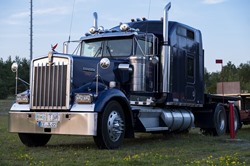How to Find the Right CDL Driving School near Hays North Carolina
 Congrats on your decision to become a truck driver and enroll in a truck driving school near Hays NC. Perhaps it has always been your dream to hit the open highway while driving a big ole tractor trailer. Or maybe you have conducted some analysis and have discovered that an occupation as a truck driver provides good pay and flexible job prospects. No matter what your reason is, it’s important to receive the proper training by choosing the right CDL school in your area. When assessing your options, there are several factors that you’ll need to examine before making your ultimate choice. Location will undoubtedly be an issue, particularly if you need to commute from your Hays residence. The expense will also be of importance, but selecting a school based entirely on price is not the optimal means to guarantee you’ll get the right education. Just remember, your objective is to learn the knowledge and skills that will enable you to pass the CDL exams and become a qualified truck driver. So keeping that objective in mind, just how do you decide on a truck driving school? That is what we are going to address in the balance of this article. But first, we are going to discuss a little bit about which commercial driver’s license you will ultimately need.
Congrats on your decision to become a truck driver and enroll in a truck driving school near Hays NC. Perhaps it has always been your dream to hit the open highway while driving a big ole tractor trailer. Or maybe you have conducted some analysis and have discovered that an occupation as a truck driver provides good pay and flexible job prospects. No matter what your reason is, it’s important to receive the proper training by choosing the right CDL school in your area. When assessing your options, there are several factors that you’ll need to examine before making your ultimate choice. Location will undoubtedly be an issue, particularly if you need to commute from your Hays residence. The expense will also be of importance, but selecting a school based entirely on price is not the optimal means to guarantee you’ll get the right education. Just remember, your objective is to learn the knowledge and skills that will enable you to pass the CDL exams and become a qualified truck driver. So keeping that objective in mind, just how do you decide on a truck driving school? That is what we are going to address in the balance of this article. But first, we are going to discuss a little bit about which commercial driver’s license you will ultimately need.
Which Commercial Drivers License Will You Need?
 In order to operate commercial vehicles lawfully within the USA and Hays NC, a driver needs to obtain a CDL (Commercial Driver’s License). The three license classes that a driver can apply for are Class A, Class B and Class C. Given that the topic of this article is how to select a truck driver school, we will discuss Class A and B licenses. What differentiates each class of CDL is the type of vehicle that the driver can operate in addition to the GVWR (Gross Vehicle Weight Rating) or GCWR (Gross Combination Weight Rating). Following are short explanations of the 2 classes.
In order to operate commercial vehicles lawfully within the USA and Hays NC, a driver needs to obtain a CDL (Commercial Driver’s License). The three license classes that a driver can apply for are Class A, Class B and Class C. Given that the topic of this article is how to select a truck driver school, we will discuss Class A and B licenses. What differentiates each class of CDL is the type of vehicle that the driver can operate in addition to the GVWR (Gross Vehicle Weight Rating) or GCWR (Gross Combination Weight Rating). Following are short explanations of the 2 classes.
Class A CDL. A Class A Commercial Drivers License is needed to drive any vehicle that has a GCWR of more than 26,000 lbs., including a towed vehicle of more than 10,000 lbs. Several of the vehicles that drivers may be able to operate with Class A licenses are:
- Interstate or Intrastate Tractor Trailers
- Trucks with Double or Triple Trailers
- Tanker Trucks
- Livestock Carriers
- Class B and Class C Vehicles
Class B CDL. A Class B CDL is required to drive single vehicles having a GVWR of more than 26,000 lbs., or a GCWR of greater than 26,000 lbs. including a towed vehicle weighing up to 10,000 lbs. A few of the vehicles that drivers may be qualified to operate with Class B licenses are:
- Tractor Trailers
- Dump Trucks
- Cement Mixers
- Large Buses
- Class C Vehicles
Both Class A and Class B Commercial Drivers Licenses may also need endorsements to drive certain kinds of vehicles, such as passenger or school buses. And a Class A license holder, with the proper required endorsements, may drive any vehicle that a Class B licensee is authorized to operate.
Click Here to Get Free Information on Truck Driving Schools Near You!
How to Evaluate a Trucking School
 Once you have determined which CDL you wish to pursue, you can start the undertaking of evaluating the Hays NC truck driving schools that you are looking at. As previously mentioned, location and cost will certainly be your primary considerations. But it can’t be emphasized enough that they should not be your only concerns. Other issues, including the experience of the instructors or the reputations of the schools are similarly if not more important. So following are some additional points that you need to research while carrying out your due diligence before choosing, and especially paying for, your truck driving training.
Once you have determined which CDL you wish to pursue, you can start the undertaking of evaluating the Hays NC truck driving schools that you are looking at. As previously mentioned, location and cost will certainly be your primary considerations. But it can’t be emphasized enough that they should not be your only concerns. Other issues, including the experience of the instructors or the reputations of the schools are similarly if not more important. So following are some additional points that you need to research while carrying out your due diligence before choosing, and especially paying for, your truck driving training.
Are the Schools Accredited or Certified ? Not many trucking schools in the Hays NC area are accredited due to the stringent process and expense to the schools. However, certification is more typical and is provided by the Professional Truck Driver Institute (PTDI). A school is not obligated to become certified, but there are several advantages. Potential students know that the training will be of the highest standard, and that they will get lots of driving time. For example, PTDI mandates 44 hours of real driving time, not ride-alongs or simulations. So if a school’s course is certified (the course, not the school is certified), students know that the training and curriculum will comply with the very high benchmarks set by PTDI.
How Long in Operation? One clue to help determine the quality of a truck driving school is how long it has been in business. A negatively reviewed or a fly by night school typically will not be in business very long, so longevity is a plus. On the other hand, even the top Hays NC schools had to start from their opening day of training, so consider it as one of multiple qualifiers. You can also ask what the school’s track record is relating to successful licensing and job placement of its graduates. If a school won’t share those numbers, search elsewhere. The schools should also have associations with local and national trucking companies. Having a large number of contacts not only affirms a quality reputation within the profession, but also bolsters their job placement program for students. It also wouldn’t hurt to check with the North Carolina licensing authority to confirm that the CDL trucker schools you are considering are in compliance.
How Effective is the Training? At a minimum, the schools should be licensed in North Carolina and hire teachers that are experienced and trained. We will talk more about the teachers in the next segment. In addition, the student to instructor proportion should be no greater than 4 to 1. If it’s any higher, then students will not be obtaining the personalized instruction they will need. This is particularly true regarding the one-on-one instruction for behind the wheel training. And look out for any school that professes it can train you to drive trucks in a relatively short time period. Training to be an operator and to drive a tractor trailer skillfully takes time. Most Hays NC schools provide training courses that range from 3 weeks to as long as two months, depending on the class of license or kind of vehicle.
How Good are the Teachers? As earlier mentioned, it’s imperative that the teachers are trained to teach driving techniques and experienced as both drivers and instructors. Although several states have minimum driving time requirements to qualify as an instructor, the more professional driving experience an instructor has the better. It’s also important that the teachers stay current with industry advancements or any new laws or changes in regulations. Evaluating teachers may be a bit more intuitive than other criteria, and possibly the ideal approach is to visit the school and talk to the teachers in person. You can also talk to a few of the students going through the training and find out if they are satisfied with the quality of instruction and the teacher’s ability to train them.
Enough Driving Time? Most importantly, a great trucking school will furnish lots of driving time to its students. Besides, isn’t that what it’s all about? Driving time is the real time spent behind the wheel driving a truck. While the use of simulators and ride-a-longs with other students are necessary training methods, they are no replacement for real driving. The more training that a student receives behind the wheel, the better driver she or he will become. And even though driving time varies between schools, a good standard is 32 hours at a minimum. If the school is PTDI certified, it will provide at least 44 hours of driving time. Check with the Hays NC schools you are looking at and ask how much driving time they provide.
Are they Captive or Independent ? You can obtain free or discounted training from a number of trucking schools if you make a commitment to drive for a specific carrier for a defined period of time. This is called contract training, and the schools that provide it are called captives. So instead of having relationships with numerous trucking lines that they can place their graduates with, captives only work with one company. The benefit is receiving free or less expensive training by giving up the freedom to initially be a driver wherever you have an opportunity. Naturally contract training has the potential to limit your income opportunities when starting out. But for many it may be the ideal way to get affordable training. Just remember to inquire if the Hays NC schools you are contemplating are independent or captive so that you can make an informed decision.
Provide Onsite CDL Testing? There are some states that will allow 3rd party CDL testing onsite of truck driving schools for its graduates. If onsite testing is available in North Carolina, find out if the schools you are considering are DMV certified to provide it. One benefit is that it is more accommodating than contending with graduates of other schools for test times at North Carolina testing centers. It is moreover an indicator that the DMV deems the approved schools to be of a higher quality.
Are the Class Times Accessible? As earlier mentioned, CDL training is only about 1 to 2 months in length. With such a brief duration, it’s important that the Hays NC school you choose provides flexibility for both the curriculum and the scheduling of classes. For example, if you’re having difficulty learning a particular driving maneuver, then the instructor should be willing to spend more time with you until you have it mastered. And if you’re still working while attending training, then the class scheduling needs to be flexible enough to fit in working hours or other commitments.
Is Job Placement Offered? Once you have received your commercial driver’s license after graduating from trucking school, you will be impatient to begin your new profession. Verify that the schools you are reviewing have job placement programs. Find out what their job placement ratio is and what average salary their grads start at. Also, ask which local and national trucking firms their graduates are referred to for hiring. If a school has a poor job placement rate or not many Hays NC employers hiring their grads, it may be a clue to search elsewhere.
Is Financial Assistance Given? Trucking schools are comparable to colleges and other Hays NC area trade or technical schools when it comes to loans and other forms of financial assistance being offered. Ask if the schools you are reviewing have a financial assistance department, or at least someone who can help you understand the options and forms that need to be submitted.
Class B CDL School Hays North Carolina
 Choosing the appropriate truck driving school is an important first step to starting your new occupation as a long distance or local truck driver. The skill sets that you will learn at school will be those that shape a new career behind the wheel. There are a number of options offered and understanding them is crucial to a new driver’s success. You originally came to our website because of your interest in Class B CDL School and wanting information on the topic Truck Driving School Prices. But first and foremost, you must obtain the necessary training in order to operate a big commercial vehicle in a safe and professional fashion. If you are short on funds or financing, you may need to consider a captive school. You will pay a reduced or even no tuition in exchange for driving for their contracted carrier. Or you can choose an independent trucker school and have the option of driving for the trucking firm of your choosing, or one of several affiliated with the school. It’s your decision. But regardless of how you obtain your training, you will soon be part of an industry that helps our country move as a professional truck driver in Hays NC.
Choosing the appropriate truck driving school is an important first step to starting your new occupation as a long distance or local truck driver. The skill sets that you will learn at school will be those that shape a new career behind the wheel. There are a number of options offered and understanding them is crucial to a new driver’s success. You originally came to our website because of your interest in Class B CDL School and wanting information on the topic Truck Driving School Prices. But first and foremost, you must obtain the necessary training in order to operate a big commercial vehicle in a safe and professional fashion. If you are short on funds or financing, you may need to consider a captive school. You will pay a reduced or even no tuition in exchange for driving for their contracted carrier. Or you can choose an independent trucker school and have the option of driving for the trucking firm of your choosing, or one of several affiliated with the school. It’s your decision. But regardless of how you obtain your training, you will soon be part of an industry that helps our country move as a professional truck driver in Hays NC.
Truck On in These Other North Carolina Locations
Motion Picture Production Code
The Motion Picture Production Code was the set of industry moral guidelines that was applied to most United States motion pictures released by major studios from 1930 to 1968. It is also popularly known as the Hays Code, after Will H. Hays, who was the president of the Motion Picture Producers and Distributors of America (MPPDA) from 1922 to 1945. Under Hays' leadership, the MPPDA, later known as the Motion Picture Association of America (MPAA), adopted the Production Code in 1930, and began rigidly enforcing it in mid-1934. The Production Code spelled out what was acceptable and what was unacceptable content for motion pictures produced for a public audience in the United States.
From 1934 to 1954, the code was closely identified with Joseph Breen, the administrator appointed by Hays to enforce the code in Hollywood. The film industry followed the guidelines set by the code well into the late 1950s, but during this time, the code began to weaken due to the combined impact of television, influence from foreign films, controversial directors (such as Otto Preminger) pushing boundaries, and intervention from the courts, including the Supreme Court.[1][2] In 1968, after several years of minimal enforcement, the Production Code was replaced by the MPAA film rating system.
In 1922, after several risqué films and a series of off-screen scandals involving Hollywood stars, the studios enlisted Presbyterian elder Will H. Hays to rehabilitate Hollywood's image. Hollywood in the 1920s was badgered by a number of widespread scandals, such as the murder of William Desmond Taylor and alleged rape of Virginia Rappe by popular movie star Roscoe "Fatty" Arbuckle, which brought widespread condemnation from religious, civic, and political organizations. Many felt the movie industry had always been morally questionable.[3] Political pressure was increasing, with legislators in 37 states introducing almost one hundred movie censorship bills in 1921. Faced with the prospect of having to comply with hundreds, and potentially thousands, of inconsistent and easily changed decency laws in order to show their movies, the studios chose self-regulation as the preferable option. Hays was paid the then-lavish sum of $100,000 a year (equal to $1,496,819 today).[4][5][6] Hays, Postmaster General under Warren G. Harding and former head of the Republican National Committee,[7] served for 25 years as president of the Motion Picture Producers and Distributors of America (MPPDA), where he "defended the industry from attacks, recited soothing nostrums, and negotiated treaties to cease hostilities".[4]
Business Results 1 - 10 of 1

